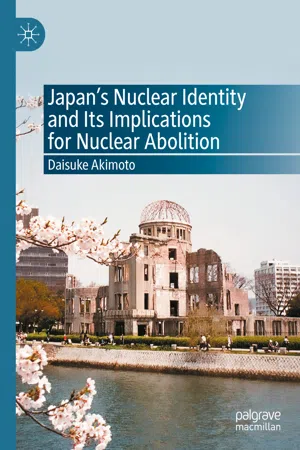On 7 July 2017, the Nuclear Weapons Prohibition Treaty or the ‘Treaty on the Prohibition of Nuclear Weapons’ (TPNW) to ban nuclear weapons in general was adopted in the United Nations General Assembly. The TPNW is a historic legal instrument to comprehensively illegalize nuclear weapons, and the International Campaign to Abolish Nuclear Weapons (ICAN ) that contributed to the creation of the Treaty was awarded a Nobel Peace Prize. Nonetheless, the Japanese government did not support the Treaty. Why does the Japanese government hesitate to support the TPNW despite the fact that Japan is the sole country that has ever suffered from nuclear attacks? How should the Japanese government make a contribution to nuclear abolition under the US nuclear umbrella? In order to explore these fundamental research questions, this book examines Japan’s ‘nuclear identity’ and its policy toward nuclear disarmament and non-proliferation in application of international relations theory.
Quite a few books and research papers on Japan and nuclear weapons have been published in Japan and around the world. In the field of peace research or peace studies in particular, nuclear issues have been raised and addressed as one of the core research issues in numerous publications,1 and peace researchers have examined and explored conditions for creating a world without nuclear weapons.2 Theoretically speaking, however, earlier studies tend to rely on a particular or a few theoretical perspectives of international relations that can be categorized as classical liberalism, neoliberalism, classical realism, and neorealism, and hence, ended in providing limited perspectives on this research case.3 In a category of classical liberalism that is congruous with anti-war/anti-nuclear pacifism which desires ‘perpetual peace’ and ‘disarmament’,4 most publications are related to inhumane aspects and devastating consequences of atomic bombs dropped on Hiroshima and Nagasaki.5
In order to scrutinize the negative images of the atomic bombings in Hiroshima and Nagasaki, some publications collected and observed testimonies of so-called atomic bomb survivors, or hibakusha ,6 while some researchers investigated how images of hibakusha are depicted in Japanese films.7 With regard to the atomic bomb survivors, Japanese researchers have analyzed anti-nuclear peace movement in Japan.8 As an anti-nuclear peace movement, some Japanese peace researchers shed light on the importance of the ‘Russell-Einstein Manifesto’ in relation to the abolition of war and nuclear weapons.9 Understandably, earlier research tended to focus on Japan’s ‘non-nuclear policy’ and ‘nuclear allergy’ stemming from the anti-war/anti-nuclear pacifism.10 In line with the classical liberalist viewpoint, these publications represent the anti-nuclear sentiments in Japan and around the globe.
Theory of neoliberalism premises that ‘international cooperation’ is desirable and possible under the anarchic world.11 In this sense, Japan’s nuclear disarmament policy as a form of international cooperation is consistent with the theoretical philosophy of neoliberalism. Whereas classical liberalists criticize the inhumanity of nuclear weapons, neoliberalists value international nuclear disarmament and non-proliferation regimes. Earlier studies have investigated Japan’s nuclear disarmament policy under an anarchic international system and the Japan-US military alliance.12 Likewise, it has been observed that civil society has influenced the formation of Japan’s nuclear disarmament policy.13 Unsurprisingly, some research on nuclear disarmament coincided with anti-nuclear peace movement to abolish nuclear weapons, such as the Pugwash Conference which could also influence Japan’s nuclear disarmament policy.14
Classical realism emphasizes the importance of national interests and national power in terms of security and strategic policy.15 In this sense, classical realists have investigated Japan’s security and non-nuclear policy in relation with international security environment surrounding Japan. In East Asia, three nuclear-armed states, Russia, China, and North Korea, exist as neighboring countries of Japan and can be regarded as potential and actual threats to the peace and security of Japan.16 Although earlier works examined the possibility of Japan’s acquisition of nuclear weapons for self-defense,17 Japan decided to remain a non-nuclear state under the US nuclear umbrella in the Cold War politics. From a classical realist perspective, it is necessary to consider nuclear and missile threats of North Korea which have influenced Japan’s security policy and nuclear identity.
From a neorealist perspective, it is strategically imperative for Japan to maintain and strengthen the military alliance with the United States in an anarchic world.18 For this reason, earlier works are inclined to examine the strategic importance of the Japan-US military alliance itself,19 and to focus on the extended deterrence of the United States, namely the US ‘nuclear umbrella’ for Japan and other allies.20 Notably, declassified documents in earlier research indicated that Japan used to accept introduction of US nuclear weapons into the territory of Japan in the Cold War political context.21 In this sense, an updated analysis of the extended nuclear deterrence of the United States, particularly including the Nuclear Posture Review (NPR), in light of the Japan-US military alliance is essential in considering Japan’s role in the global nuclear disarmament and its limitations.
Evidently, earlier studies are apt to overlook synthetic and comprehensive theoretical perspectives on Japan’s policy on nuclear disarmament and non-proliferation.22 For example, earlier research has examined Japan’s ‘security identity’ in terms of its nuclear disarmament and non-proliferation policy,23 as well as Japan’s ‘nuclear identity’ as a ‘nuclear threshold state’ in an application of a particular or a few theories and an approach of international relations.24 However, their anal...
